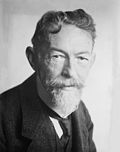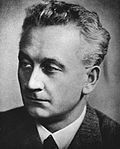| Year(s) | Image | Nominee | Field | Nominated by |
|---|
| 1911, 1914, 1917 |  | Loránd Eötvös [11] | Physics | Izidor Fröhlich [ hu; de ], Radó von Kövesligethy, Jenő Klupathy [ hu ], Philipp Lenard |
| 1901 |  | Vilmos Schulek [ hu; de ] [12] | Physiology or Medicine | Lajos Thanhoffer [ hu ], Antal Genersich [ hu ] |
| 1901 |  | Endre Hőgyes [ hu; de ] [13] | Physiology or Medicine | Frigyes Korányi, Antal Genersich [ hu ] |
| 1901 |  | Josef von Fodor [14] | Physiology or Medicine | Endre Hőgyes [ hu; de ], Antal Genersich [ hu ] |
| 1901, 1931, 1937 |  | Sándor Korányi [15] | Physiology or Medicine | Ottó Pertik [ hu ], Pál Hári [ hu ], Louis Nékám, Emil Grósz [ hu ], Zoltán Vámossy [ hu ], József Frigyesi [ hu ], István Tóth [ hu ], Géza Illyés [ hu ], László Kétly [ hu ], Tibor Verebélÿ [ hu ], Philipp Schwartz, Lajos Ádám [ hu ] |
| 1904 |  | István Apáthy [16] | Physiology or Medicine | Willem Rommelaere |
| 1928, 1940 |  | Géza Mansfeld [ hu ] [17] | Physiology or Medicine | László Rhorer [ hu ], István Rusznyák |
| 1943 |  | Ladislas J. Meduna [18] | Physiology or Medicine | Jakob Klaesi |
| 1949, 1950, 1951, 1952, 1953 |  | Hans Selye [19] | Physiology or Medicine | ... |
| 1950 |  | Miklós Jancsó [ hu ] [20] | Physiology or Medicine | József Frigyesi [ hu ], Béla Issekutz [ hu ], Sándor Mozsonyi [ hu ] |
| 1901, 1902 |  | Ferenc Kemény [21] | Literature | Imre Pauer [ hu ], Gusztáv Heinrich [ hu ] |
| 1925, 1926, 1927 |  | Ferenc Herczeg [22] | Literature | Members of the Hungarian Academy of Sciences |
| 1935 |  | Dezső Szabó [23] | Literature | Björn Collinder |
| 1936, 1937 |  | Cécile Tormay [24] | Literature | János Hankiss [ hu ], Károly Pap [ hu ], János Horváth [ hu ], Jenő Pintér [ hu ], Fredrik Böök |
| 1965, 1966 |  | Gyula Illyés [25] | Literature | John Lotz [ hu ] |
| 1965-1970 |  | George Popják [26] | Chemistry |
| 1967 |  | György Lukács [27] | Literature | Erik Lindegren |
| 1969, 1970 |  | László Mécs [ hu ] [28] | Literature | Watson Kirkconnell |
| 1970, 1971 |  | Sándor Weöres [29] | Literature | Áron Kibédi Varga [ hu ] |
| 1911, 1928, 1929, 1930, 1932 |  | Albert Apponyi [30] | Peace | 19 Professors of Law, Members of the Faculty of Law at the University of Pécs, Members of the Faculty of History and Philosophy at the University of Szeged, Members of the Faculty of Philosophy at the University of Pécs, Members of the Faculty of Law at the University of Debrecen (József Tisza [ hu ]), The Hungarian Inter-Parliamentary Group (Albert Berzeviczy), The professors at the Faculty of Law at the Elisabeth University of Pécs, 3 professors at the Faculty of Philosophy at the University of Pécs, Professors at the Faculty of History and Philosophy at the University of Szeged |



































